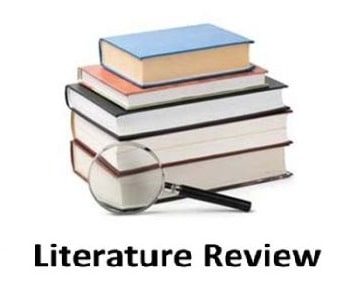
UNIVERSITY COLLEGE BIRMINGHAM FULLY FUNDED VI ..
May 13 - 2025

A literature review is
usually the second chapter in a research project or dissertation. It shows how
the related works in a field of study influence what a researcher is doing in
his own research work. The objective is to use the academic works you will
consult to provide a stimulus for your own work.
Before you consider which
content to include from your literature, you need to remind yourself of the
main purposes of your work. The literature review provides the historical
background for your research and also gives the overview of the current context
your research is situated. It does this by referring to contemporary debates,
issues, and questions in the field of study.
Literature review also gave
a discussion of the relevant theories and
concepts on which your research work is based. It also introduces to you to
relevant terminologies and definitions that you will use to clarify the terms
in the context of your work.
But why should you conduct
a literature review for your undergraduate or postgraduate studies?
Importance
of literature review
1. You will not be accused of
plagiarism: Imagine that you have conducted and written a
research work on your area of specialization. When you submit the work, you
learn that someone somewhere has conducted a similar research. Now you didn’t
copy their work, but because of the similarities in your work, you may be
accused of incidental plagiarism. That is why it is necessary that you seek out
and read from all other works in your field of study.
Then you can reference them in your work and add your own views in your own
work.
2. You will have an affinity with
people: Once people see your literature review, they will
believe that you did your homework well.
This will create a sense of
togetherness between you and your readers. Your lecturers and others will give
you full credit for doing your due diligence. The thorough research you do in
your project or dissertation will make people see you as an expert in that
field.
This comes about because
you listed many books, articles and other sources in your review of past
literature. This makes you trustworthy and people will value your work more.
3. Your review sharpens your work :
As you start gathering your sources for your work, you will analyze, aggregate,
condense, summarise, evaluate and synthesize all these information so that you
will be able to get only the important ones. This will enable you to have a
laser focus on your work, thereby removing the fluff and presenting only the
needed and required materials needed for the research work. This will also help
people to see the relevance of your work among all other works in that field.
Now we have seen three main
reasons why you should conduct a literature review, how do you go about it? To
have an effective review, you need to consult both present and old materials in
your research topic. Search for a database in your topic in all the
peer-reviewed sources like journals and other sources like government websites,
research groups and organisation. Make good use of the university library and
get all the information you need. Doing this will ensure that you write
an awesome literature review.
One Great way of getting
reliable and current Literature Review for your research paper is by
visiting Google
Scholar This Awesome site provides
researchers with Scholarly articles that can be used as a great source for
reference purposes. The most awesome feature about this site is that the user
gets to choose date ranges for materials on the site.
Your review of literature
should include all relevant sources around your topic. Search comprehensively
all databases surrounding your research using your research keywords.
Explore every resource
available including government websites, journals, organisation materials, and
research groups. Also ask the librarians for help as they can suggest other
sources you may not have heard. As long as it is related to your field of
study, gather it, analyze it and organise it for research purposes.
To summarise here are the
sources for academic literature - original reports of research work in
journals, letters, diaries, speeches, autobiographies, government websites,
interviews, textbooks, official reports, court records, newspapers, artifacts,
biographies, photographs, magazines, and drawings. Use all these sources for a
great literature review.
Consulting past and current
work for your literature is important as it gives a thorough overview and
summary of the events on the given topic. It helps to selectively and
creatively and bring out ideas for your own writing. This makes the readers
have a sense of focus and gives them a direction where the research is headed.

May 13 - 2025

May 12 - 2025

Apr 04 - 2025

Mar 17 - 2025
